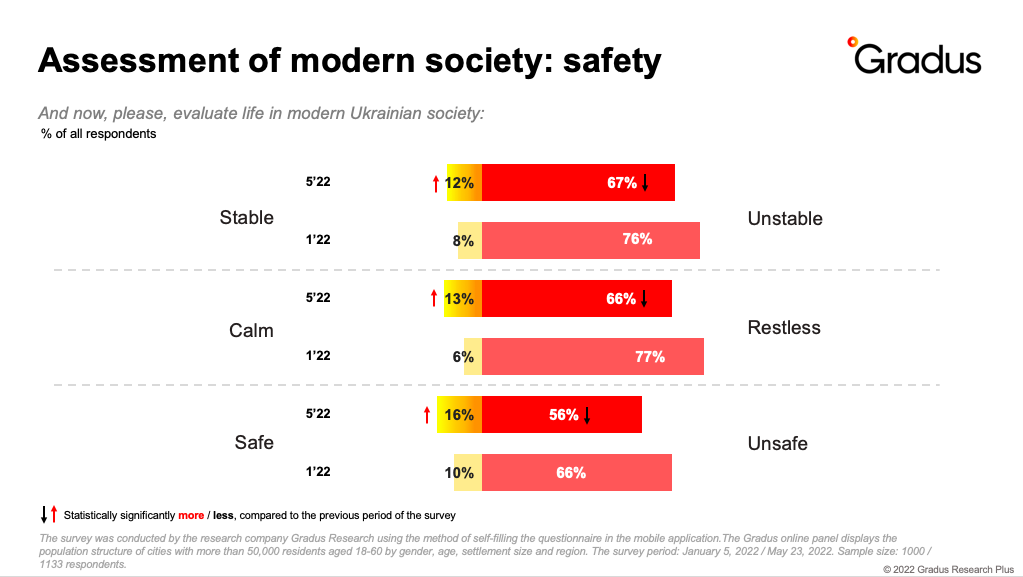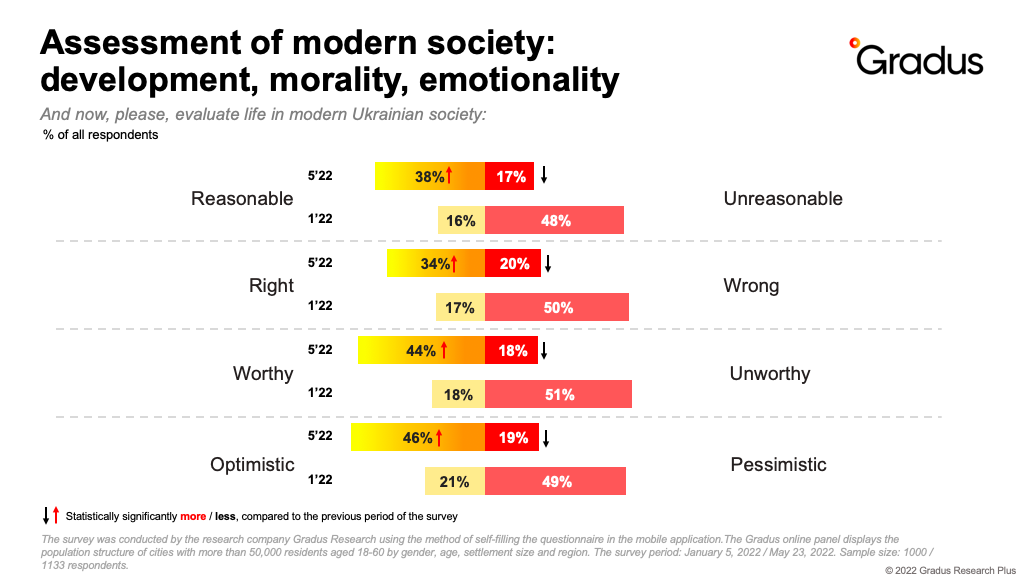The phenomenon of resilience: why do Ukrainians hold out despite more than 300 days of extreme life in the war?
Authors:
Olena Zlobina, Doctor of Social Sciences, Head of the Department of Social Psychology in the Institute of Sociology the NAS of Ukraine
Evgeniya Bliznyuk, sociologist, CEO & Founder of Gradus Research company
Advertisement:
Despite the long time spent in extreme conditions of martial law and constant existential threats, the picture of the psychological state of Ukrainians during the war does not look too alarming. This is proven by the results of the Gradus Research study on mental health and the attitude of Ukrainians towards psychological assistance during the war, which was conducted at the end of September 2022. Then 41% of the respondents rated their mental health in the range of 8 to 10 points (on a scale of 1 to 10, where 1 means "I have a lot of problems with my mental health" and 10 means "I have no problems with my mental health").
That is, we see a more or less satisfactory psychological state of the population during the war, but how to explain such a phenomenon? Why, despite all the stressors of martial law, do Ukrainians maintain sufficiently high psychological stability?
It seems that extreme living conditions for more than 10 months should radically disrupt the usual flow of life and lead to the destruction of people/s vision of the world. At the same time, real changes can be assessed only by knowing what vision of the world preceded it. To do this, we will compare the results of two survey waves conducted by Gradus Research in January and May 2022.
The picture of the world "before the war": life is sad and unstable
Before the full-scale russian invasion of Ukraine in early 2022, most respondents rated life as restless (77.1%) and unstable (75.6%). Half of the respondents considered the direction of the country's development to be incorrect (50%) and unreasonable (48.2%). Negative assessments of the moral dimension of life significantly exceeded positive ones, in particular, 50.9% considered it unworthy, and only 18.2% considered it worthy. The emotional palette of life perception was also negative: most respondents considered it sad (58.5%) and unhappy (50.2%).

This perception of life was a reaction to a prolonged situation of uncertainty, as the social transformations that have taken place since 2014 have not ended, and the hybrid war has continued. At the same time, the formation of the world vision was influenced by the COVID-19 pandemic, which also significantly shook the usual living conditions, and worsened the well-being of the population.
The picture of the world "at war": a reference point for victory
In May 2022, during the second wave of the study, it turned out that the general perception of the world vision during the war became not worse, but better. Moreover, this happened in all components by which modern life was evaluated. And this was facilitated by the transition from a situation of uncertainty to an extreme situation. Despite all the problematic moments, it gave life clear guidelines and even contributed to the improvement of the security assessment.
In particular, despite the reality of possible dangers, the share of those who considered life dangerous decreased from January to May 2022 by 10% (from 66% to 55.6%).
The vector of development received a clear final point – the end of the war. Accordingly, all its components made sense – to make the end of the war happen requires activity, and therefore the assessment of life as active increased from 31.6% to 52.7%.

The share of those who rated life as unreasonable (48.2%) and wrong (50%) decreased sharply – to 17.1% and 19.5%, respectively.
The vector of morality strengthened on the positive pole due to the sense of justice in the fight against the aggressor.
The assessment of life as worthy increased from 18.2% to 44%, 57.3% against 21.6% considered life human.
The struggle for the protection of life and freedom was reflected in the perception of life as free, this assessment was supported by 58% of respondents in May 2022 compared to 29.5% in January 2022.
Positive changes also occurred in the emotional state of the population: the ratio of optimists and pessimists changed in a mirror manner. If "before the war" almost half of the respondents felt pessimistic, and there were only 20% of optimists, at the time of the second wave of the survey, the number of optimists increased to 46.4%, and less than 20% of pessimists remained.
The vision of the world became simpler, and life goals became clearer, which contributed to the mobilization of psychological resources and formed the basis of the psychological strength that sociological research currently records. Moreover, it is safe to say that the vector of determination to win is unchanged and will support the mobilization of the psychological potential of Ukrainians in the future.
Summing up, we can say that the war became a catalyst for the meaning of life. It is clear that the psychological resources of the population are highly mobilized to make Ukrainian victory closer.
The research was conducted by the method of self-completion of the questionnaire in the mobile application. In the first wave, the sample reflected the structure of the population of Ukrainian cities with more than 50,000 inhabitants by gender, age (18–60 years), size of the settlement and region. Survey period: January 5, 2022. Sample size: 1000 respondents. In the second wave, the sample reflected the structure of the population that lived before the war in Ukrainian cities with more than 50,000 inhabitants, by sex, age (18–60 years), size of the settlement and region. Survey period: May 23, 2022. Sample size: 1133 respondents.
Research on mental health and the attitude of Ukrainians towards psychological help during the war reflected the structure of the population that lived before the war in Ukrainian cities with a population of more than 50,000, by gender, age (18–60 years), size of the settlement and region. Survey period: September 22-26, 2022. Sample size: 2100 respondents.






